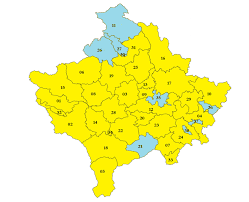 Two representatives of Macedonians from Kosovo region Gora will be part of the Consultative Council on Minorities in Pristina.
"The Council will comprise of two representatives each from Montenegrins, Roma, Egyptians, Gorani, Vlachs and Croats, one of whom to be deputy in the Kosovo Parliament. The Council will also include a representative from the Government, Parliament, the President's Office, as well as other relevant agencies", said Kosovo Foreign Minister Enver Hoxhaj.
Macedonians from Gora submitted a request for their inclusion in the Constitution on 17 November 2011, hoping for a positive response.
Gora region is exclusively inhabited by Macedonians, mainly in the Kosovo-Macedonia bordering region. President of the Union of Macedonians of Islamic Religion and informal leader of the Democratic Party of Macedonians from Gora, Ismail Bojda said over 30,000 Macedonians live in this area and the Zupa region. |






What is the self-designation for the Gorani within Kosovo institutions? Do they use the term Macedonians for themselves? Note that Bojda does not live in Kosovo, but in RM.
ReplyDeleteI don't have any links, but historically they have thought of themselves as "Muslim" in an ethnic sense, similar to the Muslims of Bosnia and Sandzak.
ReplyDeleteAfter the collapse of Yugoslavia they changed from "Muslim" to Bosniak to follow the lead of those in Bosnia and Sandzak.
Recently Macedonian Muslims, who have maintained their identity as "Macedonians of the Muslim faith", have strengthened ties with the Gorani and have seem to have been well received.
It would be great if someone wrote an article discussing this in detail.
NEW MACEDONIAN BOOK 2012: From the author Mr. Ljupco Mircevski-Trepet MY FIGHT FOR MACEDONIA!
ReplyDeletePlease visit my web site: www.myfightformacedonia.com
NOVA MAKEDONSKA KNIGA 2012: Od Avtorot G-din. Ljupco Mircevski-Trepet MOJATA BORBA ZA MAKEDONIJA!
Ve molam posetete ja mojata web stranica. www.myfightformacedonia.com
http://sv-se.facebook.com/people/Ljupco-Mircevski-Trepet/100000849458261
Best regards
Ljupco Mircevski-Trepet
The Gorani, meaning Highlanders, is an Islamic ethnic group which inhabits the Gora region, located between Albania, Kosovo and Macedonia. Another autonym of this people is "Našinci" which literally means "our people". They are also known among the neighboring Albanians by several exonyms, "Torbeshë" and "Poturë". They speak the Gora dialect, which is known by many Gorani as "Našinski".
ReplyDeleteThe Gora region comprises Dragaš municipality in Kosovo, Shishtavec municipality in Albania and the area around the Šar Mountains in Macedonia. They are adherents to Islam and have a rich and varied folk culture. They have been claimed by Serbs, Bulgarians and recently Macedonians, but the general view is that they should be treated as a distinct minority group. Some of these people are already albanised. By the last censuses at the end of 20th century in Yugoslavia they have declared themselves to be Muslims by nationality. In Republic of Macedonia their identity is also based mainly on their religion.
There is a legend of Gora, which was created at a time when very few among the people or does not use the written word.
"When God created the world, Gora was plunged worst place - among the hills and mountains, where winter lasts six months. That is why Gora was sad and dejected. God is seen as intended, and said to her:
- What are you, what you cheerless?
Worse, all in tears, replied:
- How to be happy when I am alone at the end of the world and as such no one will be me.
God would be sorry, and promised her:
- Do not be sad, I will send you the people of which you will be happy as anyone in the world are not happy. It will be sad and happy for you. Sadly, when you are left, and looking forward to when you are back.
The question of origin of the Gora population attracts many more decades authors from the Balkans and beyond. Special interest intensified during the breakup of Yugoslavia, in fact, over the past twenty years. Many authors wrote about the Gora region in their historic and political or anthropo-geographical research. Very often their positions were mainly one-sided and tendentious conclusions.
http://www.demotix.com/news/1343033/traditional-wedding-underway-gora-region-kosovo#slide-1